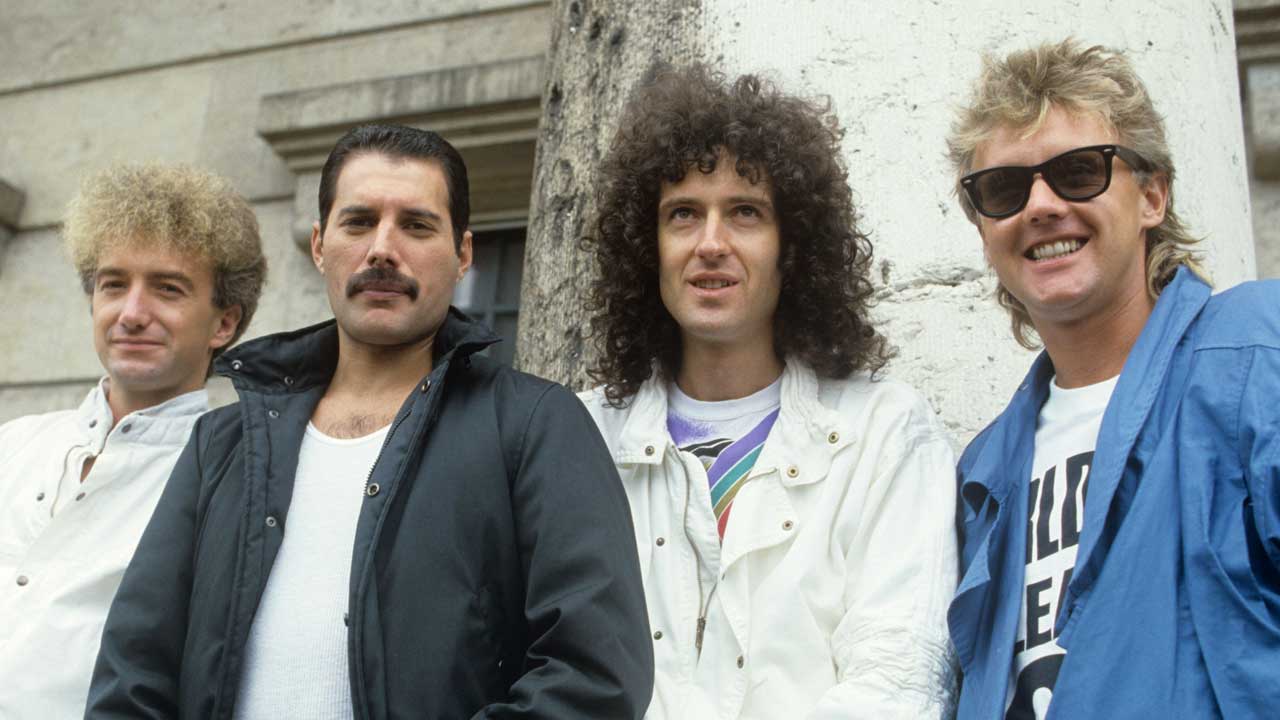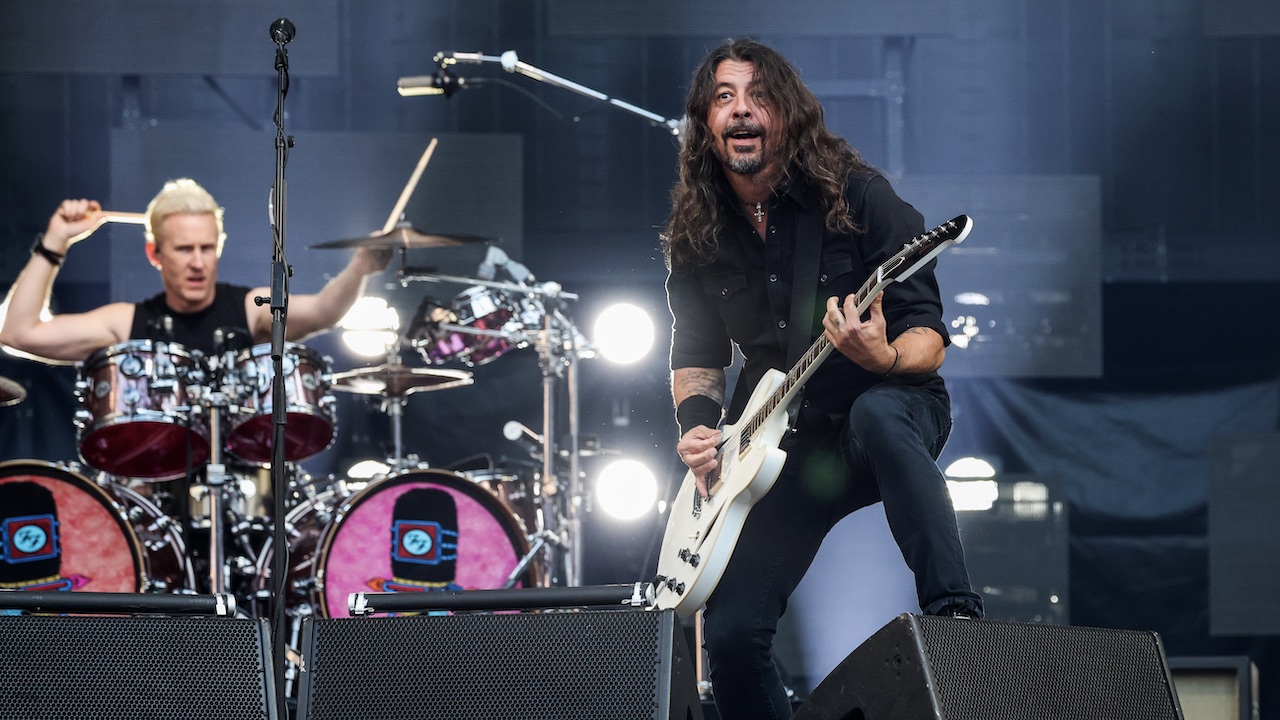Queen's Radio Ga Ga: how a song inspired by a swearing toddler proved the power of television
A song written by Roger Taylor after Freddie Mercury told him his others weren't good enough, Radio Ga Ga became a hit single and an iconic Queen classic

Select the newsletters you’d like to receive. Then, add your email to sign up.
You are now subscribed
Your newsletter sign-up was successful
Want to add more newsletters?

Every Friday
Louder
Louder’s weekly newsletter is jam-packed with the team’s personal highlights from the last seven days, including features, breaking news, reviews and tons of juicy exclusives from the world of alternative music.

Every Friday
Classic Rock
The Classic Rock newsletter is an essential read for the discerning rock fan. Every week we bring you the news, reviews and the very best features and interviews from our extensive archive. Written by rock fans for rock fans.

Every Friday
Metal Hammer
For the last four decades Metal Hammer has been the world’s greatest metal magazine. Created by metalheads for metalheads, ‘Hammer takes you behind the scenes, closer to the action, and nearer to the bands that you love the most.

Every Friday
Prog
The Prog newsletter brings you the very best of Prog Magazine and our website, every Friday. We'll deliver you the very latest news from the Prog universe, informative features and archive material from Prog’s impressive vault.
It was Roger Taylor’s young son Felix who inadvertently planted the seed for the most iconic Queen song of the 80s. The toddler, son of the drummer and his French girlfriend Dominique Beyrand, wandered into a room in his parents’ house while they were listening to the radio. Unimpressed by what he heard, Felix delivered a damning verdict: “Radio ca ca,” he said, using the French term for ‘shit’.
His father’s ears pricked up. “Radio ca ca?” That could make a good song title. Hisson’s view of the state of the music industry in the early 80s mirrored his own. Taylor Sr didn’t like the way splashy music videos had supplanted radio as the medium of choice among the day’s pop kids. Radio, he thought, needed to pull its trousers up.
“Radio was the first place I heard rock’n’roll,” Taylor grumbled to Modern Drummer magazine in 1984. “Today it seems that video has become more important than the music itself – too much so, really. Music is supposed to be an experience for the ears more than the eyes.”
Queen were at their own crossroads at the time. 1982’s disco-heavy Hot Space album had alienated a large chunk of their fan base, while a decade of relentless recording and touring pushed tempers and egos alike to breaking point. “We did hate each other for a while,” Brian May later said.
The band had taken a lengthy break from each other before reconvening in Los Angeles in the summer of 1983 for sessions for their next album, The Works. When Freddie Mercury informed Taylor that the songs he’d brought in for the record weren’t good enough, the drummer sequestered himself in a room in the Record Plant studio with a drum machine and a synthesiser to work on a song to go with what his son had uttered: “Radio ca ca.”
He didn’t really know how to work these fancy electronic gadgets, but he managed to fashion the bare bones of a song, complete with lyrics reverse-constructed from the song’s title. When he played it to Mercury, the singer’s commercial antennae were tweaked.
“I think Roger was thinking about it as just another track, but I instantly felt there was something in there – a really good, strong, saleable commodity” he later said. Fortuitously, Taylor decided to take a break from the sessions to go on holiday. Before he went he told Mercury to “do what you want” with the song. The singer took his bandmate up on his offer.
Sign up below to get the latest from Classic Rock, plus exclusive special offers, direct to your inbox!
“Roger had the ideas all together,” said Mercury, who worked on the song with assistance from session keyboard player Fred Mandel. “But I felt there were some construction elements that were wrong. I virtually took the song over.”
The changes weren’t just structural. Realising that no radio station would play a song called Radio Ca Ca, the band retitled it Radio Ga Ga, although Taylor later insisted the song’s original title remained intact in its lyrics: “If you listen closely, that’s what we’re singing: ‘Radio ca ca.’”
For much the same reason, the band’s new US label, Capitol, insisted they temper the downbeat angle of lines such as ‘You’ve had your time, You’ve had your power’. Hence a verse that celebrated radio as an ‘old friend’, warning that 'We might miss you, when we grow tired of all this visual'.
The finished track was a masterpiece of mid-80s pop-rock, simultaneously a love letter to radio and a call for it to pull up its metaphorical trousers. It throbbed with an electronic pulse that was at odds with its nostalgic longing for a time when radio was king. Its terrace-anthem chorus was accompanied by a hooky double handclap, but unusually for a Queen track there was little guitar from Brian May beyond a few licks towards the end.
The song’s criticism of the increasingly popularity of MTV didn’t stop the label splashing out north of £100,000 on a striking promo video to accompany it. Directed by music video hotshot David Mallet and inspired by Fritz Lang’s classic 1927 German expressionist sci-fi film Metropolis, it had the band zipping around a futuristic city in a flying silver car (amusingly, Mercury hid a stash of vodka in the glove compartment to stave off boredom).
For the video’s iconic centrepiece, Mallet had the band, sporting vivid red tops, stand in front of 500 extras from the Queen fan club, leading them in a choreographed mass handclap in time to the song’s chorus. The idea was that the crowd represented the unthinking masses, but it prompted NME, never great supporters of Queen, to liken the scene to a Nazi rally.
“That was so absurd,” an exasperated Taylor said in the Queen web series The Greatest. “It was meant to mirror the film… the oppressed workers. The Nazi thing is laughable. People will always find an agenda if they need one.”
The video helped take the song to No.2 in the UK. The US was a different matter. The single peaked at No.16, its progress halted when Capitol were found to have been involved in a ‘payola’ scandal a few years earlier. Independent radio promoters pulled support for all current artists, Queen among them. Radio Ga Ga dropped down the Billboard chart like a stone.
But Radio Ga Ga’s own finest hour was still to come. On July 13, 1985, Queen appeared at the Live Aid concert at Wembley Stadium. After opening with a snippet of Bohemian Rhapsody, they launched into Radio Ga Ga, and were greeted by the sight of 72,000 people mimicking the video’s handclaps back at them.
“It became one of the first great proofs of the power of television,” May said in The Greatest. “When we played it at Live Aid, everybody knew what to do.” Roger Taylor’s message had caught on, even if wasn’t in the way he’d imagined.
Dave Everley has been writing about and occasionally humming along to music since the early 90s. During that time, he has been Deputy Editor on Kerrang! and Classic Rock, Associate Editor on Q magazine and staff writer/tea boy on Raw, not necessarily in that order. He has written for Metal Hammer, Louder, Prog, the Observer, Select, Mojo, the Evening Standard and the totally legendary Ultrakill. He is still waiting for Billy Gibbons to send him a bottle of hot sauce he was promised several years ago.

